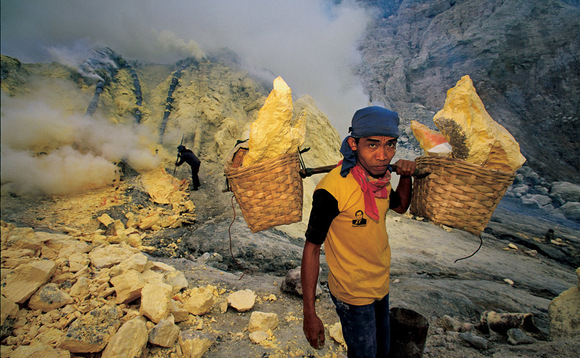
Indonesia mining: Swimming with sharks

Indonesia is resource rich and its mining sector is coveted by many foreign investors. But regulatory and legal uncertainty, plus concerns about local partners, is compelling them to sit on the sidelines
When Quantum Pacific Investment bought a stake in Intrepid Mines, it was well aware of the risks involved. Four months earlier Intrepid had lost control of its stake in Indonesia's Tujuh Bukit copper and gold deposit after spending $105 million on development. The Australian firm's interest was diluted after its local partners decided to issue fresh capital to new shareholders in June 2012. Shortly after, Intrepid's employees were forced off the site by armed police and the entire operation was shut down.
"We see the risks of operating in Indonesia as manageable just like any other emerging market," says Greg Mazur, a founding partner at Quantum. "The Intrepid Mines situation was an extreme outlier whereby the company did not follow the most basic rules of emerging markets investing."
Intrepid entered into an agreement with its partners, Indonesian couple Maya Ambarsari and Reza Nazaruddin in 2007, when mining and exploration licenses could only be held by locals. Foreign investors used nominee structures whereby Indonesians own the company that holds the concession, but a contractual arrangement allows foreigners to put in capital and extract economic benefits.
The licenses for the Tujuh Bukit Project were held by a company called Indo Multi Naga (IMN), on the understanding that 80% of the shares would be issued to Intrepid with the local partner holding the balance.
"That was the first red flag for us. You should not be investing in excess of $100 million with two nominees as your local partner who are not contributing capital and have very little ability to influence anything in Indonesia," says Mazur.
This doesn't necessarily mean the foreign party should own the asset outright. In emerging markets it often helps to share the challenges of a project, as well as the upside, with a strong local partner who can help address issues on the ground. However, finding a trustworthy partner is easier said than done.
According to Luke Devine, foreign legal consultant at Indonesian law firm Hadiputranto, Hadinoto& Partners, at the exploration stage in speculative greenfield projects, the local partners tend to be people who were originally able to obtain the concession through relationships with local government officials. "It is a big issue and we do have clients spending a lot of time on due diligence on potential partners," he adds.
In 2009, the law changed and foreigners were allowed to hold mining licenses, which led to nominee structures being unwound and overseas players becoming direct shareholders in projects. In Intrepid's case, years went by and it still didn't have ownership. The miner stopped paying IMN's salaries in 2011 following difficulty negotiating a new shareholder agreement with management, but it continued to fund work at the site.
In July 2012, the licenses were transferred to a new majority stakeholder in IMN - a company called BumiSukses Indo (BSI). The entity is controlled by Indonesian billionaire Edwin Soeryadjaya, co-founder of Adaro Energy, the second largest coal producer in Indonesia, and also co-founder of Saratoga Capital.
Intrepid discovered the transfer in December via Australian media reports and filed complaints with the Indonesian police alleging fraud and embezzlement by the original shareholders of IMN and associated parties.
Proceeding with caution
But this is not just an Intrepid story. Mining companies have been flocking to Indonesia for its natural resources - it is the world's second-largest exporter of tin and thermal coal and the biggest producer of mined nickel. According to Indonesian government data, investment in the sector came to $4.2 billion in 2012, up from $3.41 billion in 2011. A total of 45 Australian Securities Exchange-listed mining companies now hold interests in 172 projects in Indonesia, compared to 38 companies and 140 projects a year ago.
However, foreign direct investment is still poor relative to the resource potential. "Major international companies are very reluctant to make large commitments here. Instead you have the junior, more risk-tolerant players come in to try and develop a concession," says Dane Chamorro, director of Asia Pacific at consultancy Control Risks.
This wariness can be traced back to historical volatility in Indonesia's legal and regulatory environments, as well as political patronage. When information on private companies is sparse and local relationships rule, investors fear corrupt practices.
The problems stretch all the way up to the country's biggest coal producer, Bumi Resources. Last year, UK financier Nat Rothschild, who created the company by teaming up with the Bakrie family and injecting their mining assets into his London-listed cash shell, lost control of the board in a feud with his partner after allegations of financial misconduct emerged.
The Bakries have around 200 holdings in businesses ranging from mining to media. Current patriarch Aburzial Bakrie is chairman of the country's largest political party, Golkar, and is running for president in 2014. The overlap between political leaders and entrepreneurs raises concerns of policy-making to serve vested interests.
"It's fair to say that the parliament, police and judicial system rank low in opinion polls of Indonesians with respect to transparency and effectiveness. Unscrupulous local parties are able to do extra-legal things that foreign parties cannot do because they are subject to home country regulation," says Chamorro.
Such complaints about transparency and fluidity of policy are common to many emerging economies, but Indonesia differs somewhat due to the decentralization of political power. Policy is ostensibly made in one place, but implementation can be very different at a local level.
An amendment to the Mining Law gives regional governments rather than the central government the authority to determine which geographic areas are open for mining activities in Indonesia. Put simply, once the central government has laid out the standards for concessions and obligations, it is up to local officials to decide whether or not mining companies have met those standards.
This is likely to have a significant impact on the awarding of new licenses because it adds an additional layer of approvals and coordination between agencies. Vested interests and special privileges for local applicants emerge in the confusion.
Richard Dailly, managing director for global risk consultancy Kroll Advisory Solutions, adds that the situation is complicated by tensions between mining regulations and agricultural and land ownership laws, opening further potential for abuse. The "clean and clear" status introduced by the government to protect investors by, among other things, ensuring mines have no overlapping concessions of the same kind, is a case in point.
"There have been cases where ‘clean and clear' statuses have been granted for mining, whilst knowingly granting other kinds of licenses to others," says Dailly. "For instance, a crude palm oil license could be granted in the same area as a coal license. Usually, these overlap disputes are resolved by profit sharing or other financial settlements, but miners have been known to give up licenses."
UK-based Churchill Mining is locked in a battle with local authorities over a U$1.8 billion coal project in Borneo, alleging that it was forced out by well-connected local investors. The dispute revolves around the revocation of Churchill's East Kutai coal site license in 2010 - Indonesian authorities claim that Churchill illegally cut down protected forest, but the company claim says the government arbitrarily altered the terms after the site was found to have vast reserves.
The licenses were then awarded to Nusantra Group, which is owned by Indonesian politician PrabowoSubianto.
Possibly in reaction to the Churchill case, in 2012 the law was changed so that authority over license holders with foreign shareholding was taken out of the local government hands. The central government will administer those concessions while the local governments deal with domestic-only cases.
"For Indonesia it was quite a quite a big change because since 2000, post the Suharto era, there was a strong push towards regional autonomy and giving power to the local government and this was a very clear reversal," says Hadiputranto's Devine.
Additional hurdles
Other recent changes to the rules governing the mining sector have also discouraged foreign investors. In 2009, the law allowing overseas players to hold shares in mining projects was passed with an obligation to sell down an unspecified amount to Indonesians over time. Then a year later, it was announced the divestment requirement would be 20% after five years of production. The certainty of ownership was welcomed by investors.
However, the government then did an about-face in 2012 and changed the requirement. Majority foreign-owned license holding companies would have to start selling down by 20% after five years - and then give up 51% of their stake to locals after 10 years.
These changes in ownership laws have had an adverse impact on the reward miners' expect to receive for the risk they have taken. When partial divestment is done part way through a mine life, the mining company has paid for 100% of the investment but will be giving up a percentage of the future return. In the case of large projects that require significant upfront capital expenditure, 10 years might be too short a period of time even to realize a return.
There is also the concern that foreign players would have to sell to locals at below market value if fewer buyers can afford an interest.
One reason the Indonesian market has kept running quite hot over the last five years was coal mining by power companies. Most of the M&A buyers have been captive users - Indian, Thai, Japanese and Korean utilities who actually need to take the coal from Indonesia to another jurisdiction and burn it in a power plant there. But they have been spooked by uncertainty over ownership.
"At the height of the market we had 40 Indian clients looking at buying mines for captive use of the coal back in India," says Devine. "Now those players have gone away because of the challenges of trying to work in a 51% Indonesian partner as a shareholder and still make that vertically integrated business model work."
The fall in commodity prices is also putting pressure on the viability of staying in production. While foreign investors have the option of mothballing their exploration operations for the next seven years, Indonesian mine owners who went into production at a time when prices were peaking are now losing money every day they open for business.
The expectation is some of these owners will be forced to sell in the next 6-12 months - and at realistic valuations. For now, though, the price expectations of buyers and Indonesian sellers are still quite a way apart, and in the absence of transactions, mines are being shut down to stop the bleeding.
But some private equity players are using this as an opportunity to buy in. Earlier this year Provident Capital Partners upped its stake in Australian-listed miner Sumatra Copper & Gold, providing debt and equity funding for the company's latest gold and silver project.
Quantum, meanwhile, sees its investment in Intrepid as far from a lost cause given the Indonesian site still holds an estimated 25 million ounces of gold and 15 billion pounds of copper. According to Mazur, any significant reduction in stock market valuations from current levels would be seen as a buying opportunity. The PE firm's purchase price for Intrepid was based on a market valuation which is basically the $106 million in cash the company has on the balance sheet plus a little bit extra.
And Quantum is open to working with BSI. "A negotiated outcome which is fair to both parties is standard in Asia and it's something I've personally done many times," Mazur says. "The long-term attractiveness of investing in Indonesia remains excellent."
Latest News
Asian GPs slow implementation of ESG policies - survey
Asia-based private equity firms are assigning more dedicated resources to environment, social, and governance (ESG) programmes, but policy changes have slowed in the past 12 months, in part due to concerns raised internally and by LPs, according to a...
Singapore fintech start-up LXA gets $10m seed round
New Enterprise Associates (NEA) has led a USD 10m seed round for Singapore’s LXA, a financial technology start-up launched by a former Asia senior executive at The Blackstone Group.
India's InCred announces $60m round, claims unicorn status
Indian non-bank lender InCred Financial Services said it has received INR 5bn (USD 60m) at a valuation of at least USD 1bn from unnamed investors including “a global private equity fund.”
Insight leads $50m round for Australia's Roller
Insight Partners has led a USD 50m round for Australia’s Roller, a venue management software provider specializing in family fun parks.







